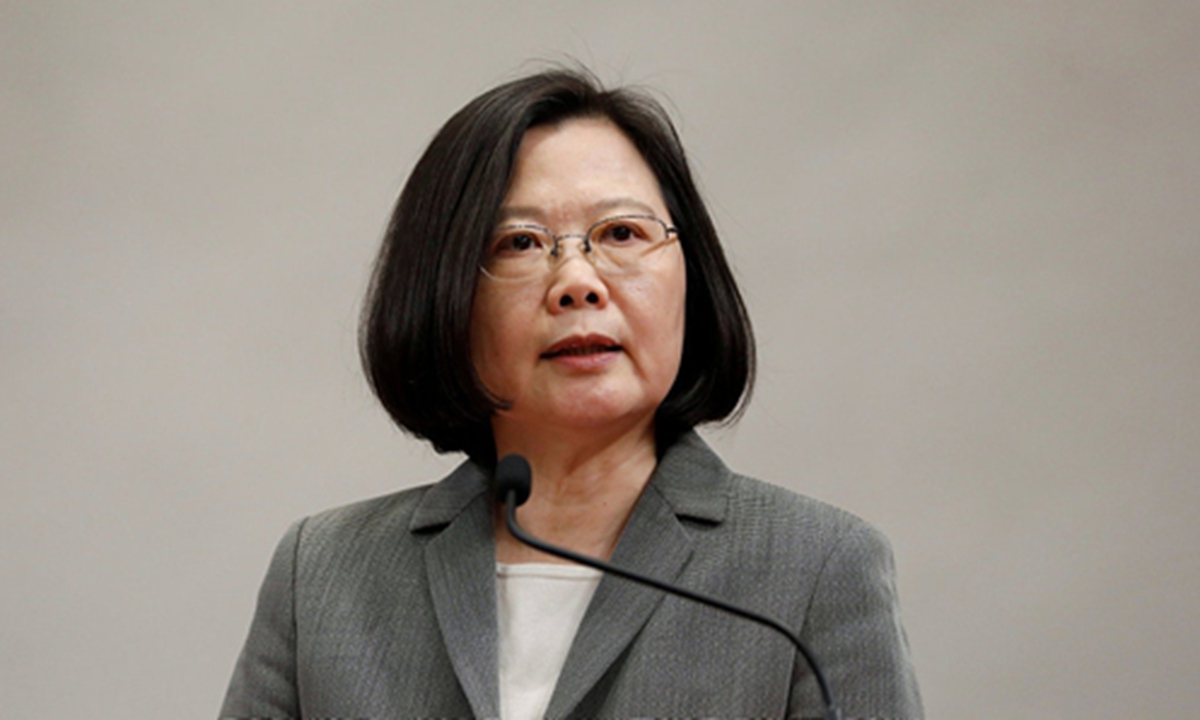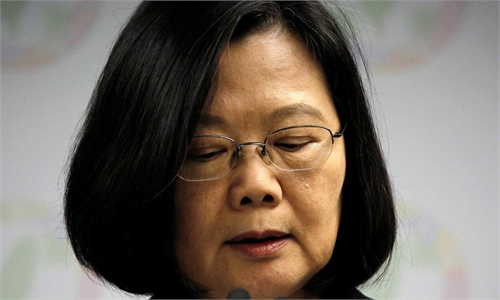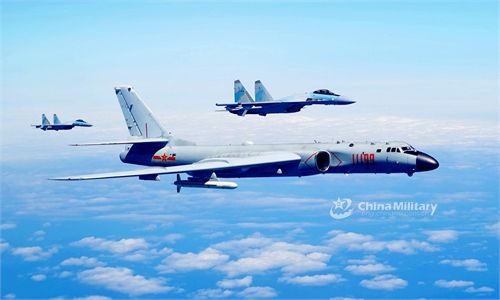
Tsai Ing-wen Photo:VCG
In an interview with CNN, the leader of the Taiwan region, Tsai Ing-wen, admitted the presence of US military trainers on the island for the first time. She claimed that US military personnel in Taiwan are "not as many as people thought," while emphasizing that the island has "a wide range of cooperation with the US aiming at increasing our defense capability."
What Tsai said is widely seen as a "breakthrough." Asked about Tsai's comments before the island's "Legislative Yuan" on Thursday, the leader of the defense authority of Taiwan, Chiu Kuo-cheng, seemed to try to soften the impact. He stressed that the US military presence is only to assist with the training of local forces, which is part of personnel exchanges, and no US troops are stationed on the island.
The US military cannot be stationed in Taiwan, and this is a red line both the US and Taiwan are aware of. It is also known that the US pursues "strategic ambiguity" instead of making a clear commitment to assist in Taiwan's defense. But the US and Taiwan have adopted a new strategy of constantly making provocative statements around the red line.
This way, they intend to show a tough stance to hedge against the strategic awe shown in the mainland's military struggle preparations and encourage the secessionist forces on the island. The Democratic Progressive Party authority is more and more worried that a war will eventually break out in the Taiwan Straits. It, on one hand, clamors to "fight to the end." On the other hand, it is aware that Taiwan's armed forces are incapable of defending the island. Yet, it still wants to encourage its supporters to maintain confidence that the US military will assist in Taiwan's defense. As a result, the DPP authority needs to keep releasing messages to create the illusion that "the US military is with Taiwan."
The strategic posture of the Chinese mainland in the struggle with Taiwan and the US is clear. But the actual contesting situation is complicated. The mainland focuses on trends and results, while Taiwan and the US are deeply influenced by electoral politics with short-term political interests. The mainland's policy has a clear principle and direction. Taiwan and the US are characterized as "talking a lot," which is related to the approval ratings of each period.
However, Taiwan and the US are absolutely clear that the mainland is serious about its bottom line. The stationing of the US military in Taiwan is crossing the bottom line. It is one of the most dangerous triggers for a war in the Taiwan Straits. Taiwan and the US have a strong intention to achieve the open symbolic presence of US troops in Taiwan by salami slicing tactics. But at the same time, they are deterred by the will of the mainland. So they move little by little, and take a step back when they sense danger, claiming that "the policy has not changed."
As long as the DPP authority rejects the 1992 Consensus and stubbornly adheres to the line of splitting the country, and the US allows and supports it, the mainland will eventually use force to liberate Taiwan island. This is one of the conditions for the use of force in the Anti-Secession Law - when the possibility of peaceful reunification of the country is lost. It has nothing to do with how to define US military personnel training of Taiwan's forces.
In the past two years, Taiwan and the US predicted that the PLA will take over Taiwan in a few years. This is the source of their anxiety and panic. On the one hand, they are clear about the fact that war may come sooner if they cross the red line that the US stations troops in Taiwan. But on the other, they have pinned their hopes that such adventurism can deter the mainland from taking military action. Taking into consideration opportunism in the approval rating, they just keep changing their words. Once the mainland shows strength, they become cowardly.
There is no doubt that the path of the DPP authority is leading to a dead end. The more they collude with external forces, the closer the punishment from the mainland will come. This cause and consequence is narrowing. As they seek reliance and protection, they are inviting the mainland to militarily solve the Taiwan question. They know they are simply quenching thirst with poison, but are still hysterically drinking toxic potion.
Mainland public should fully understand the overall situation in the Taiwan Straits and not be led by the short-term performance of the US and Taiwan. Justice, the absolute military advantage to execute punishment, and time all side with us. This means we have the initiative to decide when to punish "Taiwan secessionists" and how to solve the Taiwan question.
Facing the provocation and struggle of the DPP authority, we don't need to ask ourselves why we still don't resort to force or if we should draw another red line. We should believe in the country's strategic considerations and ability of control. We should see clearly that the DPP authority, which aims at splitting the country, has become fish in the net. They have pretended to fight desperately, but if they dare to do that, only fish will die, and no net will be broken.


